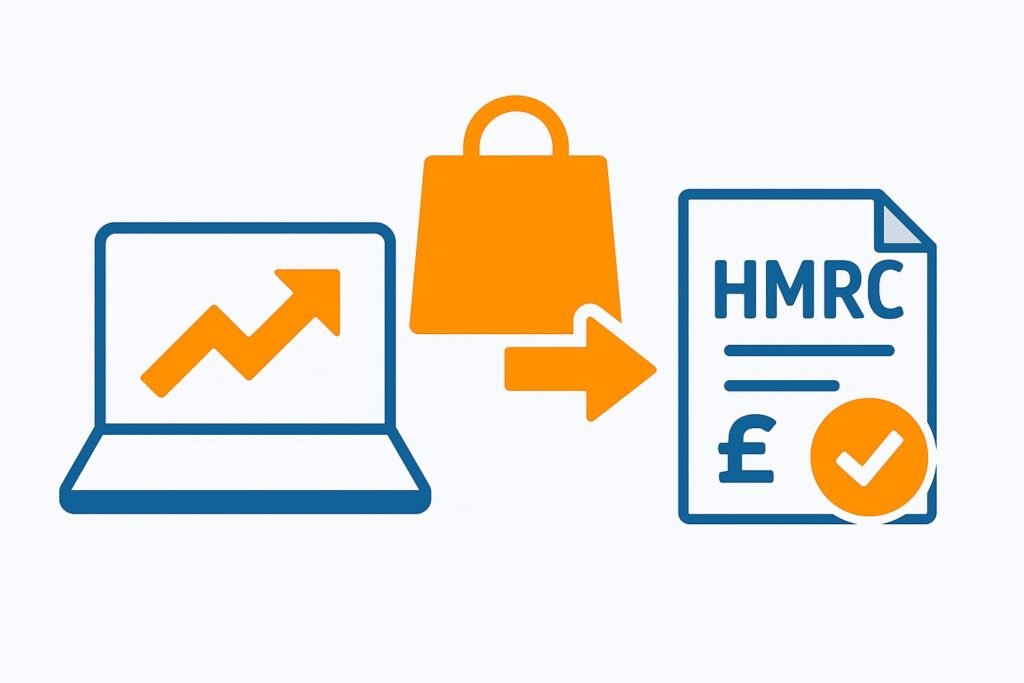
If you make some extra money via a ‘side hustle’ – by selling online – you should be aware that digital platforms now share information about sellers with HMRC. You might need to pay tax on any profits you make – but it depends!
Read on to find out what the new reporting rules are, and how to work out if you should be paying tax on profits you make from your online selling activities.
Scroll down for five key steps to take if you have a side hustle.
Online platforms must submit information on their sellers to HMRC
The Low Incomes Tax Reform Group says that HMRC has not sufficiently warned people who make money trading online via ‘side hustles’ that platforms such as eBay will start to notify the taxman of sellers’ incomes from January 2025.
Although nothing has changed in terms of tax rules – everyone must pay tax on undeclared earnings – HMRC will soon have more information on individuals who use platforms like Vinted, Etsy and Fiverr when the new reporting rules come into play next year.
HMRC estimates that the new reporting requirements could affect up to five million individuals (including the self-employed).
What exactly are HMRC’s new ‘side hustle’ reporting rules?
The new rules – which HMRC originally first announced in 2021 – work as follows:
- Online platforms store data about their sellers, including who they are, where they’re located, and how much sales income they generate each year.
- Digital platforms must submit data to HMRC by the end of January each year – for traders who generate sales over a certain threshold (see below).
- The platforms also have to send reports to affected traders.
- HMRC can share this data with international tax authorities.
- If your online activity constitutes a ‘trade’, you may have to pay tax on your profits via self assessment (see below).
Which small businesses are affected?
Online platforms already store sales information related to all of their users. However, HMRC has adopted new OECD reporting requirements.
This means that platforms have to send HMRC data on traders who have earned more than €2,000 or had more than 30 transactions over a calendar year.
Some initial reports are due in January 2025, based on 2024 sales. However, the majority of online traders will begin receiving reports from January 2026 – based on their sales activities for 2025.
Do you have to pay tax on any ‘side hustle income you earn?
You have to pay income tax on any income that hasn’t already been taxed.
However, you also have to take into account any allowances you might be entitled to.
For example, most people don’t pay any tax on income below the personal allowance (£12,570 in 2024/5).
Are your online sales a ‘hobby’ or a ‘trade’?
You need to work out if you’re simply selling a few things online (as a hobby), or if your selling activity has become a ‘trade’.
- If your selling activity is classed as a ‘trading activity’ – and there are nine ‘badges of trade’ which can demonstrate if you’re selling as a business (in HMRC’s eyes), then you must pay tax on any profits you make.
- If you do need to report any trading activities, you only declare any profits you make, i.e. what’s left after you’ve subtracted the cost of the item and any expenses you incurred such as postage and platform fees.
- If you are already registered for self assessment, you simply need to declare any profits at the end of each tax year.
- If you have made profits from trading activity, then you probably need to register for self assessment.
What about the £1,000 trading allowance?
An alternative is to claim the £1,000 trading allowance against your online trading income.
This is sometimes known as the hobby allowance’.
Unsurprisingly, the way the trading allowance works isn’t particularly straightforward.
Thankfully, LITRG has produced this helpful guide which explains your entitlement under various scenarios.
What are the concerns about the new reporting regime?
The LITRG says that its main concerns are:
- Online traders will receive reports based on the previous calendar year’s sales activities, whereas individuals and businesses work out their tax liabilities over the previous tax year (6th April to 5th April). This will make it hard to apportion activities to the appropriate tax year and pay any tax – if applicable.
- There is no standard reporting format, which means online traders could receive data in different formats depending on the platform.
- Reports are due to be sent out by 31 January each year, which is also the self-assessment tax deadline. This is the busiest time of year for HMRC, so ‘side hustle’ traders may find it harder than ever to access guidance and help.
Five things to look out for if you have a side hustle
Rob Rees, Divisional Director at Markel Direct, has provided some useful tips:
- Selling personal items is tax-free
You can sell personal items like old clothes online (e.g., on eBay, Vinted, Depop) without paying tax, as long as it’s less than you originally paid and your total sales stay under £6,000. - Declare profits from online sales
If you make over £1,000 profit from selling goods or services online, you must declare it via self-assessment and pay tax. - Don’t miss the tax return deadline
Submit your tax return by January 31st to avoid penalties. If you are new to this, the first deadline is January 31, 2025. Start gathering your online sales records now to make it easier. - Consider investing in tax investigation cover
Small business owners might want to get legal expenses insurance, which covers costs if HMRC investigates your tax return. This provides peace of mind for accidental mistakes. - Claim allowable expenses
Running a side hustle comes with equipment, delivery, or fuel costs. These expenses can lower your taxable income and reduce your overall tax bill. Check HMRC’s website for an approved list of deductible expenses.
Where to find out more information
- Read this really thorough guide to side hustles and the £1,000 rule in The Times.
- More helpful advice on side hustle tax from LITRG.
- You can check if you need to tell HMRC about additional income here.
- If you don’t know your tax position or whether your online activity amounts to ‘trading activity,’ we recommend you talk to an accountant.



